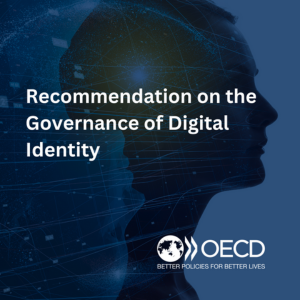Digital government
OECD Recommendation on the Governance of Digital Identity

Being able to prove who you are underpins access to a variety of essential services across the public and private sectors. As these services move online, digital channels have emerged to handle identity verification processes, proofs, and authentication of verified identity claims. As people increasingly access essential services online and even across borders, improving the governance and implementation of digital identity systems in line with user needs becomes ever more important.
The Recommendation is available in: English and French
The Recommendation on the Governance of Digital Identity, adopted by the OECD Council in June 2023, encourages its Adherents to develop and govern digital identity systems as digital public infrastructure. This involves creating and aligning sound and future-proof policies and regulations for solution providers, as well as promoting cross-sector co-ordination, international collaboration, and a healthy market for identity solutions. The development of digital identity systems should be rooted in the needs of users and service providers, respecting democratic values and human rights, including by ensuring the inclusion of vulnerable groups and minorities, and the protection of privacy.
The recommendation supports its Adherents’ efforts to ensure reliable and trusted access to digital identity for natural and legal persons that is portable across locations, technologies and sectors. The Recommendation outlines how governments can:

- Develop user-centred and inclusive digital identity systems
- Design and implement digital identity systems that respond to the needs of users and service providers
- Prioritise inclusion and minimise barriers to access to and the use of digital identity
- Strengthen the governance of digital identity
- Take a strategic approach to digital identity and define roles and responsibilities across the digital identity ecosystem
- Protect privacy and prioritise security to ensure trust in digital identity systems
- Align their legal and regulatory frameworks and provide resources to enable interoperability
- Enable cross-border use of digital identity
- Identify the evolving needs of users and service providers in different cross-border scenarios
- Co-operate internationally to establish the basis for trust in other countries’ digital identity systems and issued digital identities
launch event: OECD Recommendation on the Governance of Digital Identity
Stream of the launch event. 26 September 2023
| Introduction | High-level interventions | Panel discussion |
What is an OECD Recommendation?
An OECD Recommendation is a legal instrument adopted by the OECD Council. Recommendations are not legally binding but represent a political commitment to the principles they contain and an expectation that Adherents will do their best to implement them. There are currently around 180 OECD Recommendations in force. For more information, please consult the online Compendium of OECD Legal Instruments.
Related Documents